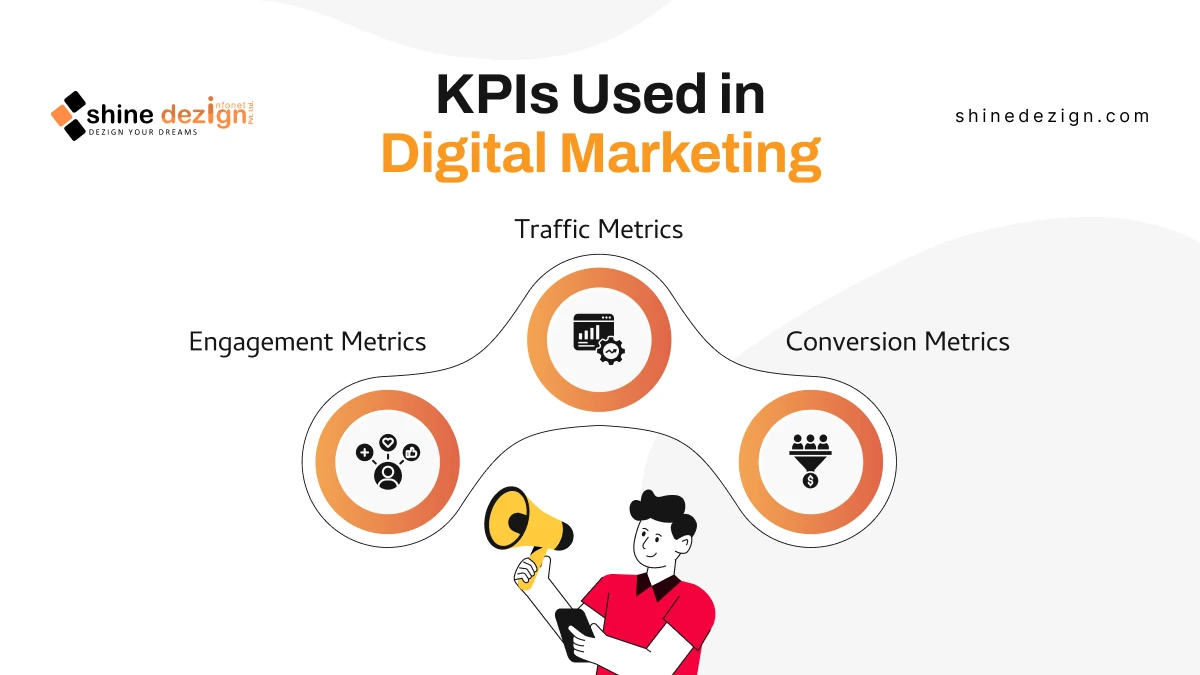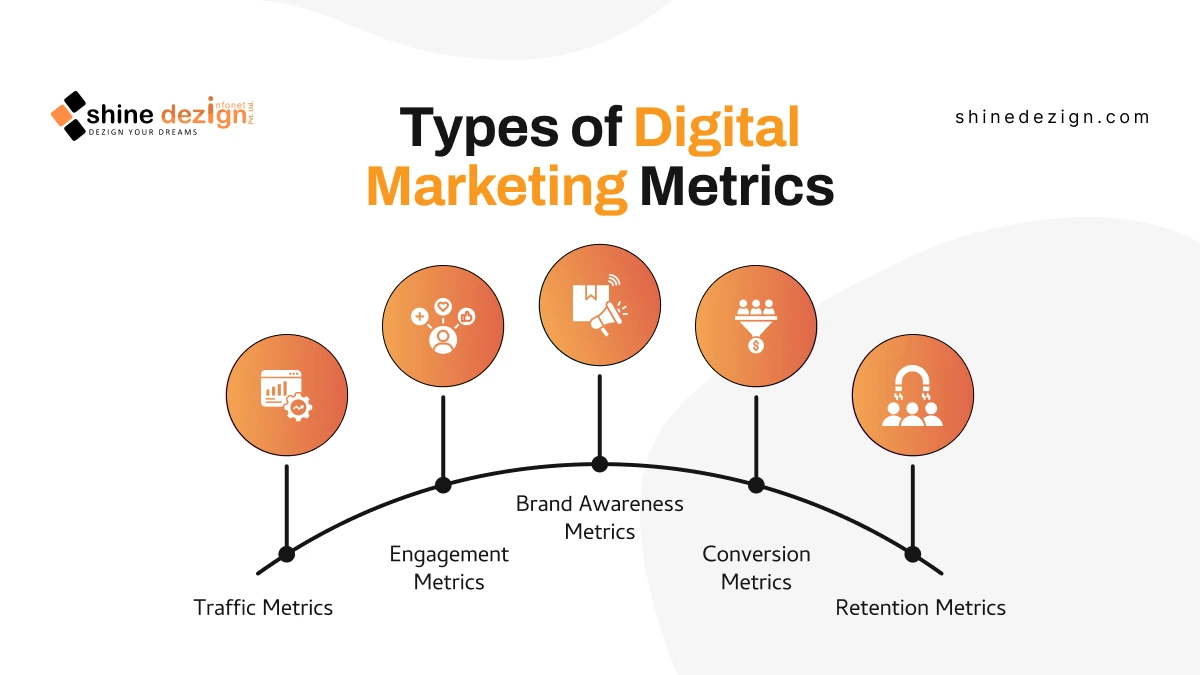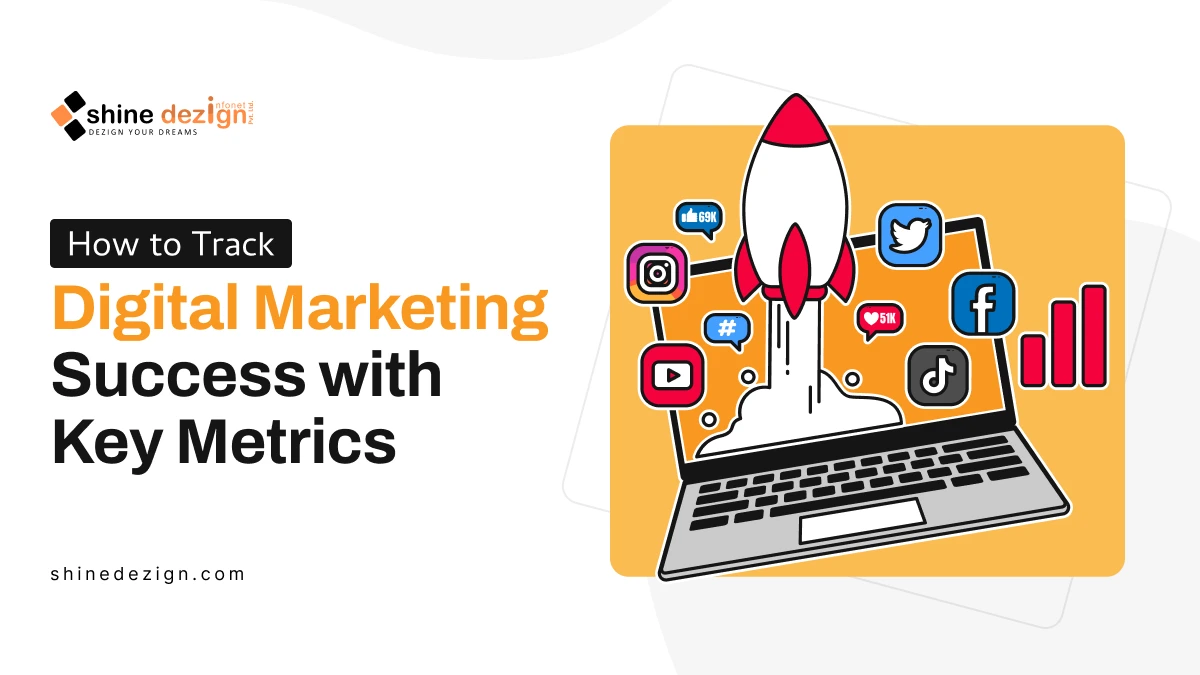As businesses are continuously adapting digital marketing techniques to reach their target audience. With this, the way of promoting products and services is transformed completely.
This process has significantly led to the rise of social media, search engines, and online advertising. However, along with this transformation, we need to implement various effective KPIs to measure the success of digital marketing campaigns.
It is crucial for all the businesses to optimize their strategies and achieve their goals. In this blog, we will explain the key metrics that can help you to figure out the effectiveness of your digital marketing campaigns.
What is Digital Marketing?
Digital marketing simplifies as the implication of digital channels & technologies to promote various products or services.
This focuses on a many online activities like search engine optimization (SEO), content marketing, social media marketing (SMM), email marketing, PPC (pay-per-click) advertising & many more related activities.
The main goal of digital marketing is to connect potential customers with your business & foster brand loyalty.
Digital marketing helps businesses to reach a wider audience across the globe, engage with customers in real-time, gather their feedback & review, and track the performance of their campaign.
In contrary to traditional marketing tools, digital marketing provides an ample amount of data for analysing the help to make informed decisions.
What is KPI?
KPI stands for Key Performance Indicators. KPIs, or Key Performance Indicators, are used to measure how well a company is meeting its business goals.
KPIS in Digital Marketing — Meaning Key Performance Indicators (KPIS) are measurable values that demonstrate how effectively a company in the context of digital marketing gauges the success of its marketing campaign.
This can help businesses understand their performance, areas for improvement and make data-driven decisions.
Depending on the goals of a campaign, the KPIs can differ from one another. For instance, if the goal is to drive traffic to a website, relevant KPIs could be the number of visitors, page views, and bounce rate.
If the goal, on the other hand, is to generate leads, KPIs might be number of sign-ups, conversion rates and cost-per-lead.
What are the KPIs Used in Digital Marketing?
Digital marketing comes with a bunch of KPIs to assess success. Here are some of the most widely used KPIs:

1. Traffic Metrics
These KPIs reflect the number of visitors to a website or landing page. Key traffic metrics include:
Unique Visitors:
The number of individual users visiting the site, allowing for a better understanding of the campaign’s reach.
Page view:
The total number of pages viewed by visitors indicates the engagement levels.
2. Engagement Metrics
KPIs help to assess the method in which users interact with the content. The important engagement metrics are:
Bounce Rate:
The percentage of visitors who only view first page and leave the site, stir up the doubt whether the content is engaging or not.
Average Session Duration:
The average time spent by users on the site reflects the quality of content.
Pages Per Session:
The average number of pages viewed by users during a single visit indicates user’s interest.
3. Conversion Metrics
These KPIs measure the effectiveness of a campaign in driving desired actions. Key conversion metrics include:
Conversion Rate:
It is the percentage of visitors who complete a desired action or in another words the number of visitors turning into shoppers.
Cost per Conversion:
It depicts the total cost of acquiring a conversion & helps to assess the efficiency of marketing spend.
Lead Generation:
The number of leads generated via a campaign.
Return on Investment (ROI):
It measures the profit of a campaign by comparing the revenue generated to the costs incurred. A positive ROI indicates that the campaign is financially successful.
Customer Acquisition Cost (CAC):
It calculates the total cost of acquiring a new customer including marketing expenses. A lower CAC indicates a more efficient marketing strategy.
Customer Lifetime Value (CLV):
This KPI estimates the total revenue a business can expect from a customer over the entire duration of their relationship. A higher CLV suggests that the business is effectively retaining customers and maximizing revenue.
What are Digital Marketing Metrics?
Digital marketing metrics are measurable values that are used to determine the success of digital marketing campaigns.
These metrics offer a glimpse into the various aspects of a campaign, allowing marketers to detect success and areas for growth.
KPIs are specific metrics that are tied to the goals and objectives of your business versus digital marketing metrics being a larger pool of data points you can pull to inform your strategy and execution.
Here are the types of digital marketing metrics

1. Traffic Metrics:
These metrics, as addressed before helping you to assess the volume and quality of the traffic being driven to your website.
- Referral Traffic: The ability to track visitors who come to your site from other sites, signifying how effective are your partnerships and backlinks.
- Organic Traffic: People who discover your site via search engines, an indicator of your SEO success.
- Direct Traffic: This is the number of visitors that actually type your URL into their browser, showing the beauty of a well-known brand and maintaining loyalty.
2. Engagement Metrics:
These, in turn, give you insight into how your audience interacts with your content.
- Social Shares: The number of people sharing your content on social media channels reflects its virality and relevance.
- Comments and Likes: How many comments and likes the audience give (on social media posts or blog articles)
- Email Open and Click Rates: The number of people that opened your emails and clicked links, showing how well your email marketing campaigns work.
3. Conversion Metrics:
These metrics are based on actions users take that align with your campaign goals.
- Abandonment Rate: The proportion of users who begin a process (such as completing a form or a shopping cart) without finishing, showing areas of possible friction.
- Lead-to-Customer Ratio: The portion of leads that become paying customers, showing how well your sales funnel keeps leads moving through it.
4. Retention Metrics:
These metrics give you an idea of how well you are keeping customers over time.
- Churn Rate: The ratio of clients who cease using your services within a certain timeframe, reflecting consumer contentment and retention.
- Repeat Purchase Rate: Percentage of customers who make additional purchases, indicating loyalty and satisfaction customers.
5. Brand Awareness Metrics:
These metrics give you an idea of how well you are keeping customers over time.
- Brand Mentions: The frequency at which your brand is mentioned across social media and online platforms, a sign of brand exposure.
- Search Volume: The total search for your brand name or related keywords, indicating brand visibility and interest.
What are the Key Metrics Used to Measure Success of Digital Marketing Campaigns?
Metrics you should focus on to measure the success of your digital marketing campaigns Essentially; you must concentrate on important metrics to measure your digital marketing campaign based on your goals. Here are some top metrics to pay attention to:
1. Website Traffic:
This is one of the most basic metrics that you should track — the number of visitors on your website. Increase of traffic generally means that your marketing strategies are successfully in reeling more potential clients.
2. Conversion Rate:
One of the most vital KPIs to pay attention to in any digital marketing campaign. High conversion rate implies that your campaign successfully convinces visitors to do what you want them to do, be it purchase a product or service or subscribe to a newsletter or fill a contact form.
3. Cost per Acquisition (CPA):
Knowing what you spend to get a new customer is crucial for determining how productive your marketing campaigns are. The lower the CPA, the more cost-effective strategy.
4. Return on investment (ROI):
By determining the ROI, you can gain insight into the profitability of your campaigns. A positive ROI means you are turning more revenue from your marketing than you have spent on it.
5. Customer Lifetime Value (CLV):
This helps you calculate how much a customer can give to your business in the long run. By comparing the CLV with CAC you can evaluate if your marketing strategies are sustainable and profitable or not.
6. Engagement Metrics:
Metrics like social media shares, comments & likes to provide valuable insights about how well your content is engaging audience. A high engagement level reflects increased brand loyalty & awareness.
7. Email Open & Click Rates:
Watching for the open and click rates is paramount in an email marketing campaign. It gives you an idea of how effective your subject lines and content are to improve future campaign strategies.
8. Bounce Rate:
Elevated bounce rates may indicate that visitors were unable to find what they anticipated on your website. Monitoring this metric will help you identify areas in which your UX and content could benefit from improvement.
9. Lead Generation:
It is essential to track the numbers of leads generated through your campaigns for you to analyse its effectiveness. This measure enables you to evaluate the quality of your leads and the effectiveness of your lead generation strategies overall.
10. Social Media Metrics:
Metrics such as follower growth, engagement rates, and reach can help you evaluate the effectiveness of your social media campaigns. These metrics provide insights into how well your brand is connecting with its audience on social platforms.
Conclusion
Performance analysis is essential to ensure optimal results from digital marketing efforts to help meet business objectives. Nowadays marketers utilize analytics to monitor crucial KPIs.
But the trends Digital Marketing help to fine-tune strategies for delivering value to audiences. After all, we want to create relationships with customers that are enduring.
By focusing on key performance indicators (KPIs), positive campaigns with active participation and growth can be ensured.
Understanding and implementing these key metrics require hands-on knowledge and the right skills. At Shine Dezign, we offer an advanced Digital Marketing Training Course in Mohali to help you master digital marketing strategies, tools, and analytics.
Your questions, our answers
Digital marketing simplifies as the implication of digital channels & technologies to promote various products or services.
Digital marketing campaigns refers to a series of online activities carried to achieve certain marketing goals.
KPI stands for Key Performance Indicators. KPIs, or Key Performance Indicators, are used to measure how well a company is meeting its business goals.
The various types of metrics in digital marketing are traffic metrics, conversion metrics, retention metrics and engagement metrics.
Organic traffic is considered those people who discover your site via search engines. It is an indicator of successful search engine optimization.













